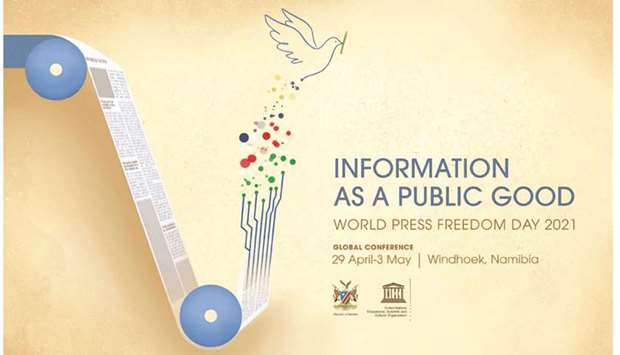* The programme will also witness the launch of the Arab Forum, 25 years after the Sana’a Declaration
A series of panel discussions, presentations, and workshop will mark the start of World Press Freedom Day in Windhoek, Namibia, from Thursday (April 29), until May 3.
The five-day event, hosted by UN Educational, Scientific and Cultural Organisation (Unesco) in virtual and in-presence participation, celebrates the 30th anniversary of the Windhoek Declaration on media pluralism and independence.
Some of the topics that will be tackled include the *Emergency Measures to Support Media Hit by Covid-19, organised by Free Press Unlimited and the INGOs (international non-governmental organisations) consortium, *Is Independent Media a Public Good and is Public Subsidy to Support it Realistic? by BBC Media Action, *Promoting Freedom Online: Tackling Online Disinformation, by Freedom Online Coalition, and *Information and Democracy: developing concrete recommendations for the sustainability of journalism, organised by the Forum on Information and Democracy (with interpretation in English and Arabic).
The programme on Thursday will also see the launch of the Youth Newsroom covering World Press Freedom Day Global Conference, the “rab Forum/25 years After the Sana’a Declaration”, and the sixth Academic Conference on the Safety of Journalists, hosted by the University of Namibia, and in partnership with the Unesco Chair on Media Freedom, Journalism Safety and the Issue of Impunity at Sheffield University, Oslo Met University, and the Journalism Safety Research Network.
The High Level Panel of Legal Experts on Media Freedom (“the Panel”), an independent body that was convened at the request of the UK and Canadian governments and comprising a diverse group of leading lawyers from around the world, will present their perspectives on the challenges that lie ahead in the media industry as part of the programme.
The Media Freedom Coalition, meanwhile, will be focusing on *The Role of Governments in Protecting Media Freedom: What more can the Media Freedom Coalition do?
The global conference’ programme on the second day will witness forums from regional World Press Freedom Day celebrations, including the Asia and the Pacific Forum, the Europe Forum, the Africa Forum, and the Latin American and the Caribbean Forum.
Other issues and topics that will be discussed in the afternoon on Friday (April 30) include *Countering Digital Disinformation while respecting Freedom of Expression, *The Future of the African Media, and *Digital and physical threats, financial pressure, access to information: How can investigative journalism survive in a hostile world?, among others.
The programme will see the launch of the “Global Drive for Media Freedom and Safety of Journalists” – with the support by the Netherlands and implemented by the Office of the United Nations High Commissioner for Human Rights and Unesco.
The third day (May 1) of the event will be “a day to listen inspiring stories from individuals making a difference on freedom of expression”, including the #PressFreedomIsMyFreedom "Watch Party", by the Namibia Media Trust, Fesmedia Africa and Deutsche Welle Akademie, at the amphitheatre of the Windhoek Zoo Park.
A tribute, *Remember the dead, fight for the living, to journalists who have died from the coronavirus (Covid-19), will also take place on May 1, in partnership with the International Federation of Journalists.
On May 2, the Natural Cultural Group will take centre-stage for a performance prior to the global opening ceremony and opening talk show *Information is a Public Good, and the Unesco/Guillermo Cano World Press Freedom Prize Award Ceremony, followed by an interview with 2021 laureate.
On May 3, a series of thematic plenaries on *Media and Information Literacy: A Pillar for Information as a Public Good, *Voices from the regions, and adoption of the Windhoek + 30 Declaration will be held to mark World Press Freedom Day.

